- Home
- Philip Donlay
Seconds to Midnight Page 2
Seconds to Midnight Read online
Page 2
“Who are you?” Donovan asked. All around them he could hear the ice pop and screech as broken sections rubbed together. She closed her eyes and her head slumped sideways. Donovan made sure he had a firm grip on her and began to run.
As Michael spotted him, he swung the slowly moving Gulfstream around so the cabin door would face Donovan’s side. Moving as fast as he could, each breath a dagger in his chest, Donovan continued to trudge toward the Galileo. He could hardly see through the ice that had built on the lenses of his glasses as he intercepted the Gulfstream and reached the first step. He staggered briefly and felt Rick reach down and take part of his load. Together they lifted the woman up the stairs and into the warmth of the cabin.
Donovan turned and took one last look at the open water where the Boeing had slipped beneath the surface. He spotted no other survivors. In the frigid air, the water was already skimming over with ice. He turned away as Rick moved past him to close the door.
“Rick, tell Michael to crank up the heat,” Donovan said over his shoulder as he hurried to where the woman lay in the aisle. He ripped off his gloves and peeled off his useless glasses. He saw her face clearly for the first time. Even with her eyes closed, and her face nearly drained of color, soaking wet and half frozen, she was hauntingly beautiful. She was maybe in her mid-twenties, with jet black hair, long enough to reach her shoulders, high cheekbones, and a distinct jawline. As he crouched and searched her neck for a pulse, the Galileo lurched forward and began to trundle down the rough makeshift runway. Once again, Donovan had to hold on to steady himself as Michael guided the powerful Gulfstream back the way they’d come. The engines spooled up to maximum thrust, and they accelerated away from the hole in the ice. The airframe shook and the wingtips rocked and flexed as the Gulfstream powered through the ridges in the ice and raced across the lake until the pounding stopped. The Galileo lifted free and climbed steeply into the frigid Canadian morning.
Airborne, and with the help of the two other men in the cabin, they began peeling off the woman’s wet half-frozen clothes. They used towels to dry her skin and then wrapped her tightly in blankets. As they worked, Donovan gathered her clothes and quickly checked the pockets, finding nothing. All he had was an unknown woman and her solemn warning.
CHAPTER TWO
DONOVAN STRIPPED OFF his coat and boots and stuffed everything in the closet. He fished in his briefcase until he found his phone and then went back and stood over the woman. He took numerous pictures of her face, turned her head gently to the side, and snapped several profile shots. He asked Dr. Samuels for a sheet of white paper and unwrapped the blanket around her just enough to extract her right hand. He couldn’t help but notice that her skin was cooler than his own. He turned to the side, ran his index finger in the recessed seat track until it came out black from the dry graphite they used as a lubricant. He smoothed it uniformly onto her thumb and forefinger and then pressed each one against the sheet of paper. He blew the excess powder away and examined the makeshift prints.
He tucked her hand back inside the blanket and then turned to Dr. Samuels. “There are some hand towels in the lavatory. Can you dampen them and heat them in the microwave? We’ll wrap them around her neck and wrists to try to heat the blood traveling through her arteries and veins.” Donovan thumbed through the images he’d shot and then pocketed the phone and went forward and sat in the cockpit jump seat.
Michael turned to face him. “Is she going to survive?”
“I’m not sure,” Donovan said, scanning the instrument panel and spotting the airport code Michael had programmed as their new destination. “CYWG. Is that where we’re headed?”
“It’s Winnipeg,” Michael said. “We’re still too far north to talk to anyone, so I chose the closest city with first-class medical facilities. As soon as we can talk to air traffic control, we’ll report the crash and give them the coordinates.”
“I need to let you guys in on something,” Donovan said. “As I carried her to the plane, she whispered for me not to tell anyone about her, or ‘they’ll kill all of us, and our families.’”
Michael turned in his seat to look at Donovan over the tops of his sunglasses. “That’s a hell of thing to say to someone trying to save your life.”
“She might not survive,” Rick said. “If that’s the case, then those were her final words, a little disconcerting to say the least.”
“We all agree that the Boeing 737 was not supposed to be in this airspace, it acted erratically, and minutes later it crash-landed. She’s the lone survivor, and neither she, nor the wreck, is going anyplace soon,” Donovan said. “I have pictures and fingerprints that I’m going to send to Montero the second we can reach the outside world. What do you two think about waiting for some further information before we turn this into an international incident?”
“I hear what you’re saying, and it’s a fine line,” Michael said. “At the moment, we’ve broken no laws. The solar storm won’t let us talk to anyone, so we’re doing what any Good Samaritan would do, which is to get the survivor to a medical facility.”
“Exactly. Let’s find out more about her and the 737 before we elect to land in Winnipeg. The last thing I want to do is end up in the middle of a crashed airplane media storm—or worse.”
“We’ll have a satellite window in ten or fifteen minutes,” Rick said. “Radio communication in maybe another hour.”
Donovan glanced at the display. Winnipeg was only an hour and a half away. He needed to work fast.
“One more thing,” Michael said. “We know nothing about what happened back there. In fact, she could be the one who caused the Boeing to crash in the first place. I’m just saying, keep an eye on her.”
“Got it.” Donovan hurried to the back of the plane and found Dr. Samuels sitting cross-legged next to the woman, taking her pulse. Hot air was pouring from the Galileo’s vents and warm towels were wrapped around her neck.
“Any improvement?” Donovan asked as he sat down at one of the science stations.
“Hard to say. Her pulse is a little stronger, but not by much. I’m not sure why she’s unconscious, unless she was injured when she was thrown into the water or she’s been drugged.”
“Do we have Internet connectivity yet?” Donovan asked Dr. Yates who sat at the adjoining workstation.
“Not yet,” Dr. Yates said, swiveling one of the larger monitors turned toward Donovan. “I thought you should see this. I went back and reviewed the telemetry we recorded of the Boeing. It’s impossible to identify the object that was thrown from the emergency exit, but I do think it’s a body. I also noticed this.”
“What am I seeing?” Donovan said as he leaned closer to the monitor.
“It’s only there for a moment, but as the camera follows the object, it briefly pans across the registration number of the Boeing. It looks like something has come loose or peeled back slightly. I’m thinking it looks like a decal, or adhesive of some sort, and just underneath there is something that looks to me like black paint.”
“We don’t know what it says, but we know what it is—the actual registration number.” Donovan leaned back in the seat. “The Saudi identification is bogus. Someone has slapped it over the real registration.”
“We’re showing a green light for Internet connectivity,” Dr. Samuels announced.
Donovan connected his phone to the computer terminal and began uploading the pictures he’d taken. He pulled down an e-mail screen and began to type. Once finished, he attached all of the images to his message and hit send. The second he confirmed it had gone out, he leaned back and hoped that, half a world away, Eco-Watch’s new Director of Security would be looking at her e-mail.
Former FBI Special Agent Veronica Montero was not only a good friend, but she had been at one time one of the most complex, intelligent, and formidable opponents he’d ever come up against. Years earlier, while she was with the FBI, she’d put him in the crosshairs of an investigation, and even though he was innocent, it had thr
eatened to destroy everything he had built over the last twenty-five years. Ultimately, they reached an uneasy peace and ended up bringing down a man who would have been one of the deadliest terrorists in history. Since then, she’d become close with not just Donovan, but with his wife, Lauren, and their daughter, Abigail. Over the last year, Montero had demonstrated her loyalty and her superb investigative skills, and as long as no one called her Veronica, she was happy. If anyone could get a jump on the identity of the unknown woman, and who owned the Boeing, it was Montero.
He thought of his wife, Lauren, and their six-year-old daughter, Abigail. With Donovan immersed in studying the massive solar flares, Lauren had taken Abigail to Innsbruck to visit their dear friend Kristof and his daughter, Marta.
Donovan missed his family but knew Abigail would have a wonderful time at the chalet. Rumor had it Kristof had brought in horses for her to ride, Abigail’s current obsession. The other Eco-Watch jet, the Spirit of da Vinci, was in Savannah, Georgia, home to Gulfstream, for maintenance and upgrades. Until a few minutes ago, it had been a fairly quiet week at Eco-Watch.
“I just scanned several Internet news outlets,” Dr. Yates said. “There’s no mention of a missing airplane anywhere in the world.”
“There will be shortly,” Dr. Samuels said. “I see on the inflight display that we’re headed to Winnipeg?”
“That’s the closest major city with first-rate medical facilities,” Donovan said, repeating Michael’s reasoning.
“You know the Canadians will question us for hours, maybe days.” Samuels pressed on his temples as if enduring a great pressure. “This solar event isn’t going to wait for the slow wheels of bureaucracy to run its course. I’d like to be back up here tonight if at all possible.”
“We will if we can,” Donovan said. “I’m waiting on some information I just requested from Eco-Watch’s Director of Security.”
“Are you talking about Ms. Montero?” Dr. Yates asked.
“Yes,” Donovan said. “You both met her in Virginia.”
“I know that Eco-Watch has the well-deserved reputation of being the preeminent privately funded research organization in the world, but how did you hire her? She’s famous,” Dr. Yates said. “She’s the FBI agent that took out the terrorist trying to attack Washington, D.C. She was even on the cover of Time magazine.”
Donovan shrugged. Though the actual story regarding the terrorist had been altered at the highest levels of the FBI, Eco-Watch, Donovan, Lauren, and Montero had all been at the center of the attack. Stopping it had been a team effort, but he’d gladly pushed the spotlight onto Montero so his family could be left out of the media frenzy. “I hired her because she’s very good at what she does. I’m glad you two understand her capabilities. Hopefully we’ll hear back soon and make a decision.”
“What kind of a decision? What are the other options?” Samuels asked.
“This is probably as good a time as any to tell you what I know. When I got to the woman, she was still conscious. She whispered for me not to tell anyone about her. She said they’ll kill all of us, and our families.”
“That’s messed up,” Samuels said as his face turned red. “I mean, we saved her. How could she say something like that?”
“That’s what I’m trying to find out,” Donovan replied. “I thought you two should know.”
“To hell with her,” Samuels blustered. “I say we fly straight to the United States and turn her over to the FBI.”
Donovan held up his hands in a calming gesture just as he spotted the arrival of an e-mail from Montero. “Gentlemen, Ms. Montero just replied; let me see what she has to say, and we’ll proceed from there.”
With a click of the mouse, Donovan opened the e-mail and was surprised by its brevity.
This woman is listed by Interpol as a Jane Doe, a woman who was possibly abducted three years ago in Krakow. A year ago, a German diplomat was murdered in Berlin and she may be connected with that homicide. Nothing but unanswered questions. Do not land anywhere until we can talk. I’ll call as soon as you’re in range.
—Montero
CHAPTER THREE
LAUREN AND MARTA sipped afternoon tea in the sunroom and admired the towering snow-covered Austrian Alps filling the expansive windows. Kristof Szanto and his daughter Marta’s gorgeous chalet outside of Innsbruck was like a bit of heaven. They’d all stayed up late last night to witness the spectacular Northern Lights. Abigail had been excited by the Aurora Borealis, or rainbow clouds, as she called them. After Kristof told her that unicorns and leprechauns had made them just for her, she’d danced with the unbridled joy of a six-year-old. Now, jet lag and the late night had taken its toll, and she had agreed to take a rare afternoon nap. Kristof also needed his rest as he endured the latest round of treatments for his prostate cancer.
Kristof and Donovan, friends since childhood, had grown up together, both the firstborn sons of families with great wealth. They’d traveled and caused mischief on four continents until they’d had a massive falling out over what they referred to as their philosophical differences. Not long ago, they’d reconnected after nearly thirty years. Donovan and Kristof, despite vast differences, shared a past that was essential for not only them, but for their families. To Donovan and Lauren’s surprise, they discovered that Kristof had a daughter, Marta, who was now in her mid-twenties. Highly intelligent, Marta had been groomed to take over her father’s business since she was a teenager. Despite years of separation, the two men had discovered that the time apart, and their prior differences, mattered little. For Lauren, Kristof was a link to her husband’s past, just as Marta needed Donovan and marveled at the stories that only he could tell.
“I love this place,” Lauren said. “The peace and quiet is so wonderful, and I can’t get over the horses.”
“It was Dad’s idea,” Marta said. “He never did get to spoil me as a little girl, so I think he’s making up for that now with Abigail.”
“She does love to ride,” Lauren said. “When I was her age it was sailing. My dad would take me out on the Chesapeake Bay, and we’d sail on this little wooden boat he’d built. We also had an antique wooden motorboat, a Chris-Craft that we would go out in, but I loved to sail. I was fascinated by using the wind to propel us through the water. I was going to be the youngest girl to sail around the world and be famous. I think that idea lasted for one whole summer.”
“Sailing, being out on the water and in the weather, is that where your interest in Earth Science began?” Marta asked.
“Probably,” Lauren said. “Though it wasn’t until a grade school science fair that I became enamored with how everything worked. Dad wanted me to be an engineer, but I wanted to be outside, living and working in the thick of it, solving problems.”
“So, a science fair sprouts a girl who graduates with a PhD in Earth Science from MIT? Who then becomes a senior analyst with the Defense Intelligence Agency?”
“Technically, I’m just a consultant,” Lauren said, though everything Marta had said was true.
Marta’s phone buzzed to life, and as she glanced at the screen, a quizzical look spread across her face.
“I’ll give you some privacy,” Lauren said as she pushed back her chair.
“No, stay. It’s Montero.” Marta picked her phone up from the table and answered. “Hello. Yes, she’s here with me. Okay, you’re on speaker.”
“Sorry to bother the two of you,” Montero said, dispensing with any niceties. “I just got an e-mail from Donovan aboard the Galileo, which I am forwarding to you as we speak. The short version is that Donovan and Michael rescued a lone female survivor from a plane crash in Northern Manitoba. He sent me her fingerprints and photographs to try and determine who she might be.”
“Why would he do that?” Marta asked as she downloaded the first image on her phone, viewed the picture. “What’s going on? They’re still airborne, right? Why is he in such a hurry to identify her?”
“You’ll read all the details, but when he
reached her in the snow, she warned him not to tell anyone about her, or they would all be killed, along with their families. I made a few discreet inquiries and the first pop came from my source at Interpol.”
“Interpol?” Marta said as her brow furrowed. “Do tell.”
Lauren studied the image of the unknown woman. Her face looked colorless, giving her the illusion of a nearly flawless porcelain doll. Tiny lines around her eyes told Lauren she was probably in her early to mid-twenties. But with the woman wrapped in blankets on the floor of the Galileo, Lauren couldn’t discern anything further. She set the phone back down on the table, trying to fit together the pieces of how such a woman could have ended up on board the Galileo with her husband.
“According to my source, using the images Donovan sent, this woman is a Jane Doe thought to be abducted in Krakow three years ago,” Montero said. “She’s also a person of interest in a homicide last year in Berlin. The victim was a German diplomat.”
Lauren saw a rare flash of unease cross Marta’s face, and a second later, it was gone. Over thirty years ago, Kristof had sold his inherited fortune and built a bigger one in the black market arms business, rising to near legendary status as the criminal known as Archangel. In certain circles, the whispered name represented one of the most feared entities in the world of organized crime. In Marta’s world, unknown people were always a concern.
“Do you know the name of the German who was killed?” Marta asked.
“No, my source didn’t have immediate access to that file,” Montero said. “We don’t know anything for sure, except that we have a possible threat on our hands.”
“This is not good,” Marta said.
Lauren felt the first unmistakable chill of vulnerability race up and down her spine. “Montero, what do you think?” Lauren asked, hoping the perceived threat was an overreaction to the ramblings of a woman traumatized by a plane crash. Montero was the Director of Security for Eco-Watch, and her responsibilities included the protection of the families of Eco-Watch employees.

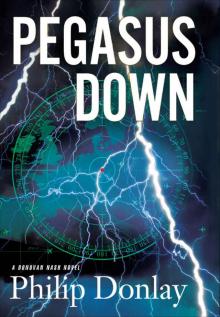 Pegasus Down: A Donovan Nash Thriller (Donovan Nash Thrillers)
Pegasus Down: A Donovan Nash Thriller (Donovan Nash Thrillers)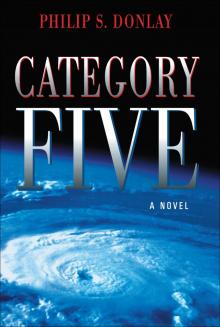 Category Five
Category Five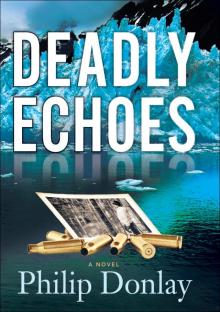 Deadly Echoes
Deadly Echoes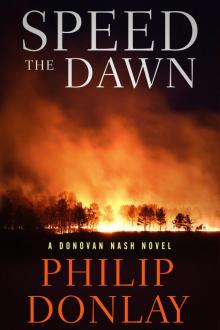 Speed the Dawn
Speed the Dawn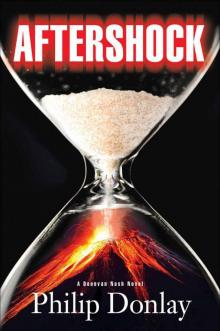 Aftershock: A Donovan Nash Novel (A Donovan Nash Thriller)
Aftershock: A Donovan Nash Novel (A Donovan Nash Thriller)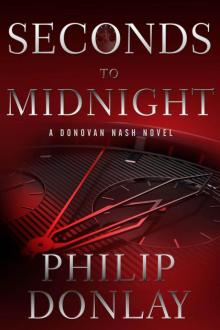 Seconds to Midnight
Seconds to Midnight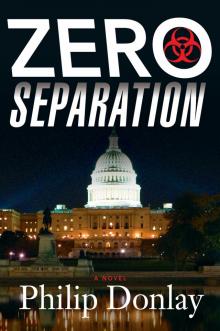 Zero Separation
Zero Separation